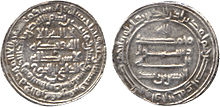Hasan ibn Zayd
| Hasan ibn Zayd | |
|---|---|
| Emir of Tabaristan | |

Silver dirham issued by Hasan
|
|
| Reign | 864–884 |
| Successor | Muhammad ibn Zayd |
| Born | Medina |
| Died | 6 January 884 Amol |
| Issue | One daughter (possibly) |
| House | Zaydid dynasty |
| Father | Zayd ibn Muhammad |
| Mother | Aminah bint Abdallah |
| Religion | Shi'a Islam |
Al-Ḥasan ibn Zayd ibn Muḥammad ibn Ismā‘il ibn al-Ḥasan ibn Zayd (Arabic: الحسن بن زيد بن محمد; died 6 January 884), also known as al-Da‘ī al-kabīr (Arabic: داعي الكبير, "the Great/Elder Missionary"), was an Alid who became the founder of the Zaydid dynasty of Tabaristan.
Al-Ḥasan was a descendant of Hasan ibn Zayd ibn Hasan, a great-grandson of Ali, the son-in-law of Muhammad and fourth Caliph. In 864, he was living at Rayy in northern Iran, when he was invited by pro-Alid elements in the neighbouring province of Tabaristan to join them in an uprising against the Abbasid authorities.
Tabaristan, a mountainous region on the southern shore of the Caspian Sea, had remained largely untouched by the Muslim conquests of the 7th century. Until conquered by the Abbasid Caliphate in 759/60, it had been ruled by a native Persian dynasty, the Dabuyids, and even after the imposition of direct Muslim rule local dynasties retained a large measure of autonomy in the mountainous interior. It was only after 840, when Tabaristan came under Tahirid rule (the Abbasids' viceroys for the East), that the Islamization of the province began. It proceeded rapidly, and although the majority of the people adopted Sunni Islam, the province offered opportunities for the activities of pro-Alid Shi'ite missionaries as well.
...
Wikipedia
